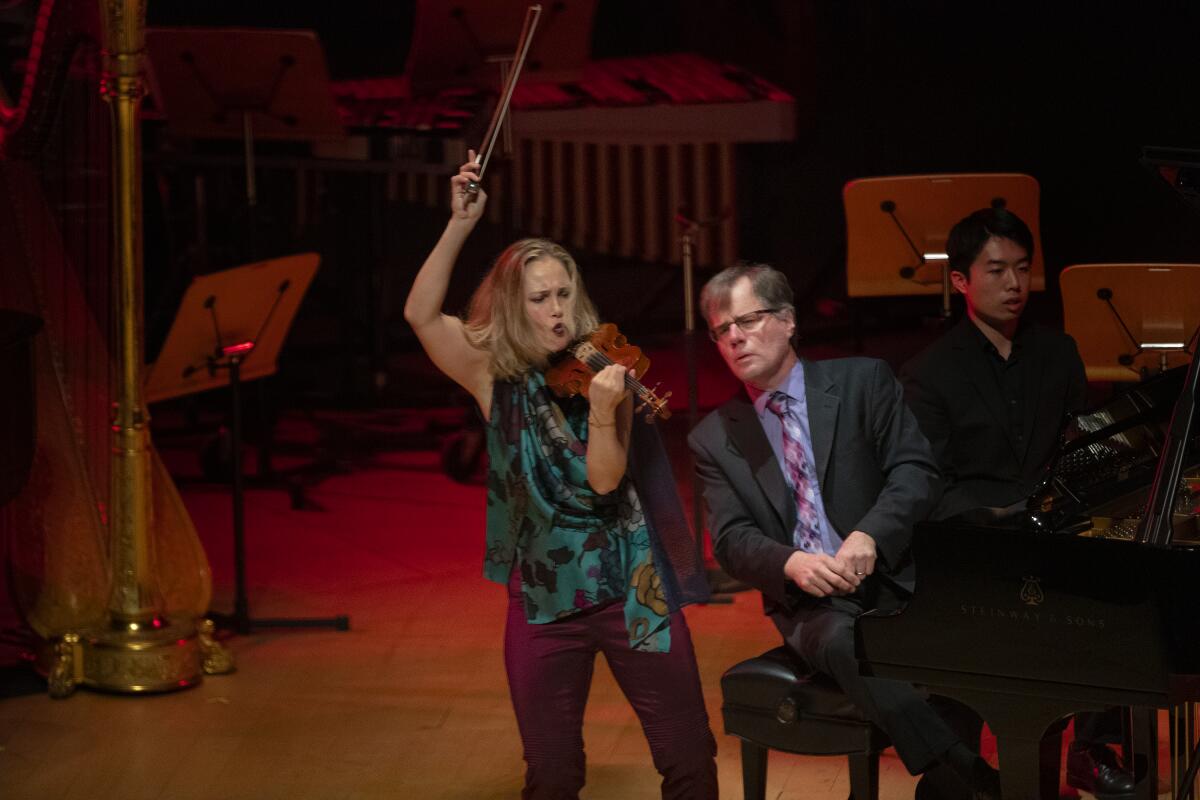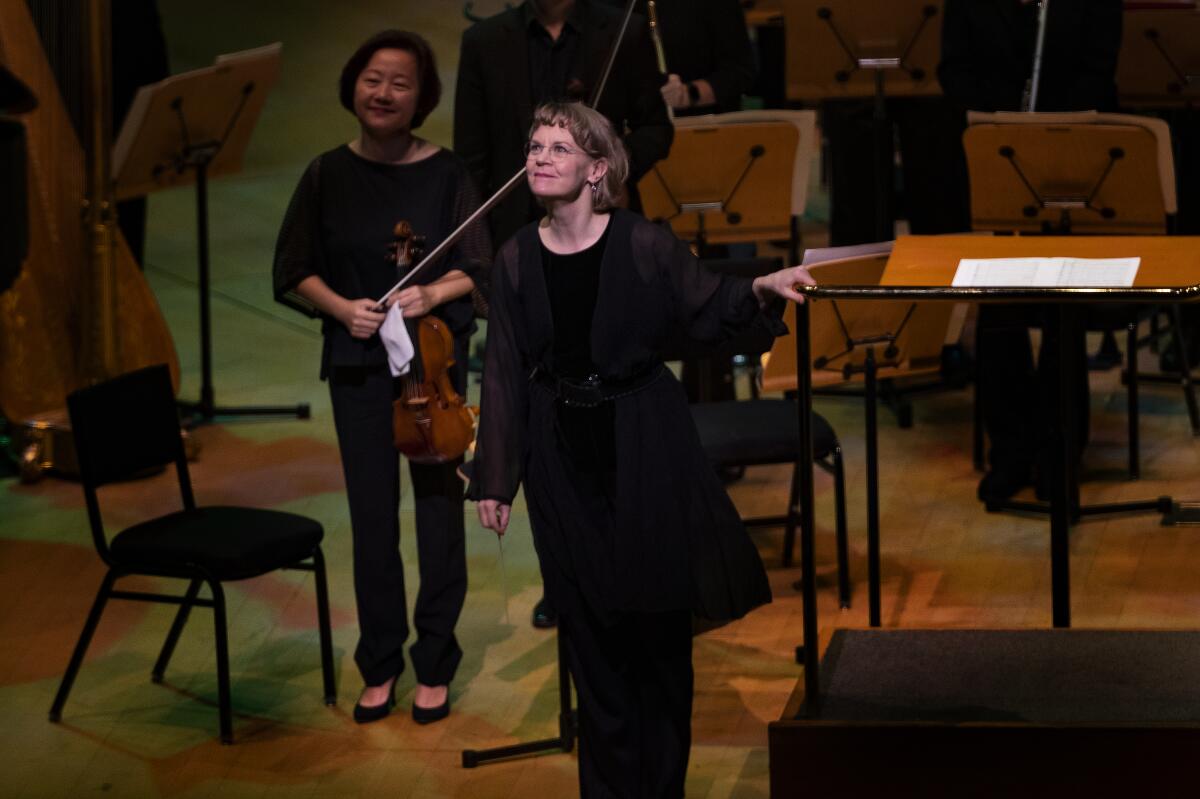Oliver Knussen, the greatest British musician of his time? The L.A. Phil pays tribute

- Share via
When the composer and conductor Oliver Knussen, a gentle and towering giant of British music, suddenly died of a massive heart attack at 66 last year, he was beloved. A year and a half later, he is already taking on the stature of a legend. The takeaway from the Los Angeles Philharmonic’s tribute to Knussen both in its weekend concert and Tuesday night Green Umbrella program in Walt Disney Concert Hall is that his legacy will inevitably continue to grow larger and larger.
Since he died, I’ve found myself tirelessly listening to his music, studying his scores, playing his recordings of all kinds of music (each one special in its own, often surprising, way), remembering his conducting live and streamed on the BBC, as well as sharing anecdotes (the supply is inexhaustible) with musicians, his students, his friends.
No one who encountered him can stop talking about Olly. In life, he was a massive man, both in height and girth. His shadow, in death, grows ever larger.
Given how frustratingly late the fanatically perfectionist composer could be in finishing, or never finishing (or not even beginning) his commissions, and given his own lovably quirky and lumbering manner, it could sometimes be hard to fully appreciate just how much Knussen mattered. But as I’ve been surveying his career as composer, conductor, educator and general man about music, I am convinced that he was the greatest British musician of his time.
For all he didn’t finish, especially in his last years, he did, in fact, leave behind a substantial body of work. Each piece, modest or not, witty or wise, is a jewel. Every note had a reason for being. His conducting was never less than illuminating and more often downright revelatory, be it his own music or that of Copland, Carter, Stockhausen, Debussy, Brahms or Britten. He conducted American music with more insight than any other non-American. When you could drag him out of the Kabuki theater, he conducted the works by his close friend Toru Takemitsu in ways that brought tears to eyes of Japanese audiences. His British and American students (he had long association with Tanglewood Music Center) are now among the world’s elite musicians.
An L.A. Phil tribute made perfect sense. It was co-curated by the orchestra’s principal guest conductor Susanna Mälkki and violinist Leila Josefowicz. Both had a long connection with Knussen, as he did with the L.A. Phil. In the 1980s and 1990s, Knussen was regularly invited to conduct here by the orchestra’s executive director, Ernest Fleischmann. This was despite the fact that Fleischmann had once been fired from the London Symphony Orchestra management by Knussen’s father, who was principal bass of the orchestra and head of its player committee.

Knussen was, furthermore, a good friend of Esa-Pekka Salonen. The orchestra commissioned a cello concerto, but it was never finished (if begun).
But this is only the start of a web of connections that Knussen wove. It just so happened that the same night as the Green Umbrella “A Tribute to Oliver Knussen,” the Ensemble InterContemporain in Paris had its own “Hommage Á Olly,” and it included Knussen’s “Songs for Sue,” a requiem he wrote for his wife Sue, an education director of the L.A. Phil who died in 2003.
It’s a small world. And it’s a big world. That’s what Knussen was about: encompassing the intimate and the vast.
Five Knussen works were on the two L.A. Phil programs. They contained but 40 minutes of music, but they said a lot. The orchestral concert featured the Violin Concerto and the flashy, brilliant, three-minute fanfare “Flourish With Fireworks,” which Knussen wrote to open Michael Tilson Thomas’ first concert as music director of the London Symphony in 1988. There’s yet another connection. The Green Umbrella featured Knussen’s “Ophelia Dances, Book 1,” which Tilson Thomas conducted from the celesta for its 1975 premiere by the Chamber Music Society of Lincoln Center. Tilson Thomas happened to be in the audience and in town to lead this week’s L.A. Phil concerts.
The Violin Concerto, the most substantial piece, was written for Pinchas Zukerman in 2002 after a more than 20-year gestation period (not atypical for Knussen). Gustavo Dudamel, in yet another connection, made his New York Philharmonic debut in 2009 conducting the concerto with Zukerman as soloist.
But Josefowicz, who performed the concerto with the L.A. Phil and Salonen in 2005, owns it. She was Knussen’s favored soloist and recorded it with him. The last of her dozens of performances of the concerto with the composer was two months before he died. Over the weekend she was on fire, delivering an almost impossibly fast and deeply stirring performance.
The three movements are only about 16 minutes but easily contain enough material for a 40-minute concerto. The forms are Baroque but made fantastical. With Mälkki in keen support, Josefowicz brought ferociously raw expression to the opening “Recitative” and a poignant lyricism to a too-moving-for-words central “Aria.” Then she turned the “Gigue” into a gripping dance of life and death.
Still, the biggest news of the tribute was “Reflection.” The nine-minute 2016 score for violin and piano was one of Knussen’s last works and his first major one in six years. The inspiration was Gauguin’s “Dans Les Vagues” (In the Waves), which was to have been the subject of a movement for a decades-old Cleveland Orchestra all-but-completed-but-not-to-the-finicky-composer’s-satisfaction commission. Watery figuration in the piano and trills in the violin set a contemplative tone that expands into supreme, stunning lyricism. It is a small, late masterpiece. Josefowicz, joined by pianist John Novacek, made it wistfully sing and dance.
The other Knussen scores were examples of his flair, spunk and fastidiousness. (Knussen liked to joke that he was the only composer or conductor for whom Leopold Stokowski and Pierre Boulez were heroes.) If “Reflection” is a composer dreamily contemplating the depths, “Flourish With Fireworks” is splashing around, and Mälkki made it sparkle.
In the two chamber pieces, Knussen again turned to early music. “Two Organa” gives late 20th century chamber music glitter to 12th century counterpoint. “Ophelia Dances” are a complex web of intertwining solos, reminiscent of Ophelia dancing on the precipice. Both were tightly managed by Mälkki.
The British works that surrounded Knussen’s were all amiable. Huw Watkins’ Piano Quartet mixed easy-going lyricism with unthreatening agitation. Helen Grime’s “A Cold Spring” showed some of Knussen’s love for complication and color filtered through her own inventively melodic character. The sampled gongs and song of Jonathan Harvey’s haunting, electronic “Mortuos Plango, Vivos Voco” echoed the gong-like chords that movingly begin and end Knussen’s Violin Concerto. Colin Matthews’ likably lively “Hidden Variables” didn’t hide the John Adams allusions, just their reasons for being.
The reasons for Beethoven’s “Eroica” Symphony as the concluding work on the weekend orchestra program had to be the commercial need for a blockbuster. But Mälkki loves a good blockbuster, and the exhilaration she and Josefowicz brought to Knussen’s Violin Concerto carried over after intermission to her knockout Beethoven, as if Knussen’s shadow ecstatically spurring her on.
More to Read
The biggest entertainment stories
Get our big stories about Hollywood, film, television, music, arts, culture and more right in your inbox as soon as they publish.
You may occasionally receive promotional content from the Los Angeles Times.











